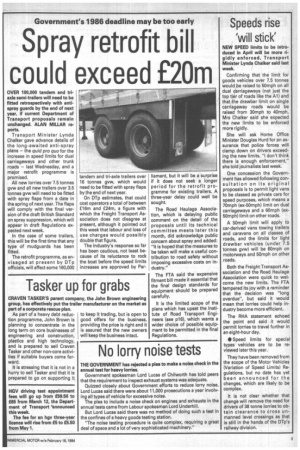Spray retrofit bill could exceed fah
Page 5

If you've noticed an error in this article please click here to report it so we can fix it.
OVER 100,000 tandem and triaxle semi-trailers will need to be fitted retrospectively with antispray guards by the end of next year, if current Department of Transport proposals remain unchanged. ALAN MILLAR reports.
Transport Minister Lynda Chalker gave advance details of the long-awaited anti-spray plans — the quid pro quo for the increase in speed limits for dual carriageways and other trunk roads — last Wednesday, and a major retrofit programme is promised.
All new lorries over 7.5 tonnes gvw and all new trailers over 3.5 tonnes gvw will need to be fitted with spray flaps from a date in the spring of next year. The flaps will comply with the final version of the draft British Standard on spray suppression, which will appear in draft Regulations expected next week.
In the case of some trailers, this will be the first time that any type of mudguards has been fitted.
The retrofit programme, as envisaged at present by DTp officials, will affect some 160,000 tandem and tri-axle trailers over 16 tonnes gvw, which would need to be fitted with spray flaps by the end of next year.
On DTp estimates, that could cost operators a total of between £16m and £24m, a figure with which the Freight Transport Association does not disagree at present, although it pointed out this week that labour and loss of use charges would possibly double that figure.
The industry's response so far has been cautious, not least because of its reluctance to rock the boat before the speed limits increases are approved by Par liament, but it will be a surprise if it does not seek a longer period for the retrofit programme for existing trailers. A three-year delay could well be sought.
The Road Haulage Association, which is delaying public comment on the detail of the proposals until its technical committee meets later this month, did acknowledge public concern about spray and added: "It is hoped that the measures to be taken will make a useful contribution to road safety without imposing excessive costs on industry."
The FTA said the expensive fitment bill made it essential that the final design standards for equipment should be prepared carefully.
It is the limited scope of the plans which has upset the Institute of Road Transport Engineers (see p16), which wants a wider choice of possible equipment to be permitted in the final Regulations.




















































































